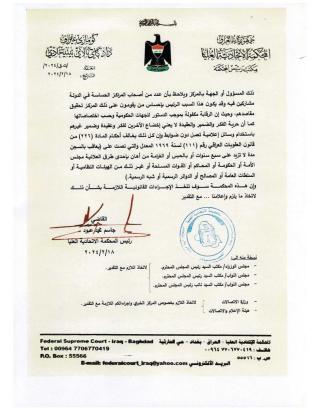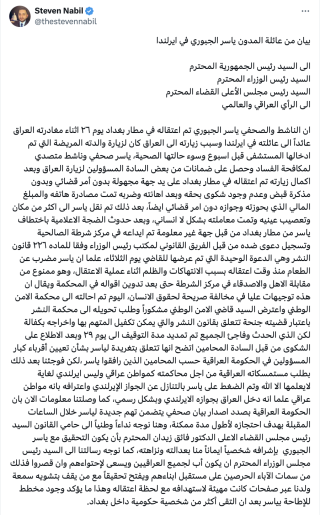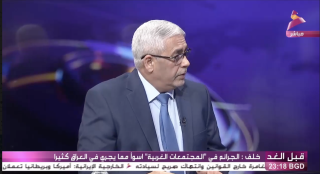
Iraq's "Resistance" Factions Shift to Major Crackdown on Media Spaces

Having stopped “resisting” U.S. forces (who shoot back), militias are focusing on unarmed activists in what appears to be a coordinated crackdown on freedom of expression.
Ever since Iraq's Tishreen protests of 2019, which the muqawama (resistance) brutally suppressed, Iranian-aligned militia groups have escalated their draconian campaign to silence any opposition in the media. Recent weeks have seen concerted attacks on anti-corruption campaigners by terrorist and militia factions in the judiciary, parliament, and government, echoed by muqawama media platforms.
Mobilizing the Judiciary
On February 18, Federal Supreme Court chief Jassem Mohammed Aboud sent a letter to Iraqi president Abdul Latif Rashid stating, “The News Center on WhatsApp run by Mustafa Kamel and his group has positioned itself to evaluate government agencies and their caretakers...in a way that does not align with public order and ethics. He and those who partner with him make accusations and use immoral words, including Yahya al-Kubaisi" (Figure 1a). The letter continues: "It has been noticed that some officials in sensitive state positions are participating in [this activity]...All of this violates Article 226 of Iraqi Penal Code No. 111 of 1969, which states, 'Anyone who publicly insults the nation’s council [the parliament], government, courts, armed forces, organizational committees, public authorities, or official or semiofficial offices...shall be punished by a sentence that does not exceed seven years' imprisonment or a fine'...This court will take the necessary legal procedures about that” (Figure 1b).
The letter appeared to cast Aboud as the complainant and the judge for this issue. The document was published online, probably on purpose, and received praise from muqawama media, who no doubt hoped to intimidate activists and prevent them from appearing in the media or expressing their opinions on social media. More specifically, Aboud signaled that Article 226 of the Baath-era publishing law, which bans criticism of state organs, would be enforced on a more regular basis going forward.
The Prime Minister and Parliament Join the Attack
In recent years, Iraqis have become accustomed to the the Communications and Media Commission (CMC) banning activists from appearing on television based on accusations such as promoting Baathism or engaging with Israel. Prominent figures subjected to this censorship include the aforementioned Yahya al-Kubaisi, along with Rabee al-Jawari, Alaa al-Nashoo, Omar Abdal-Sattar, Ahmed al-Abyad, and Imad Bajalan.
This year, however, Prime Minister Mohammed Shia al-Sudani has begun to bring Article 226 cases against media commentators who criticize him personally:
- On January 14, Sudani was the complainant when Iraqi security forces arrested commentator Mohammed Nenaa (who is close to the Sadrists) for insulting the prime minister on television. Nenaa was released from prison on January 29 after tremendous media and public pressure accusing Sudani of being a dictator.
- On February 26, security forces arrested online influencer Yasser al-Jubouri at Baghdad Airport as he was leaving for Ireland, where he is a citizen. Here, too, the Prime Minister’s Office was the complainant, claiming an Article 226 violation based on a (since-deleted) comment that Jubouri tweeted about Sudani’s nepotistic habit of placing his relatives into government offices. Notably, the complaint was issued immediately after Jubouri refused to comply with an order from Sudani’s media advisor Rabee Nader demanding that he start working as an online surrogate for the Prime Minister's Office (Figure 2).
- On February 27, Mohsen al-Mandalawi—the acting speaker of parliament who is closely linked to the Iran-backed Badr Organization—made a similar move, ordering parliament's Legal Directorate to sue any person or institution who insults the legislature or its members (Figure 3).
Assassinating Commentators: Easy to Do, Hard to Mention in Iraqi Media
On February 22, Fakhari Karim, the head of al-Mada for Media, Culture, and Arts, survived an assassination attempt by an unidentified armed group in the gated community of Qadisiyah, Baghdad. The next day, editor-in-chief Ghassan Charbel of the leading foreign newspaper Asharq al-Awsat tweeted that Baghdad had become a “factory of assassinations.”
In response, Iraq's al-Ahd TV, run by the U.S.-designated terrorist group Asaib Ahl al-Haq, interviewed former Spokesman for the Commander-in-Chief of the Armed Forces Abdul Karim Khalaf, who said that Charbel “must be sued...This shouldn’t pass, the tweet is clear targeting” (Figure 4).
A Clear and Disturbing Trend
Article 226 of the old Baath Penal Code is being readied for widespread use against critics of the Sudani government. In other words, a democracy that the United States helped build is planning to send its freedom of expression back to the era of brutal dictatorship. The Iran-backed terrorist groups and militias that control Sudani and his government are trying to snuff out all public criticism of abuses carried out by their personnel, the state organs they run, and even the prime minister himself.
These abuses and censorship efforts demand a significant international response, perhaps including U.S. postponement of Sudani’s planned April visit to the White House. Failing that, terrorist groups will conclude that they have a green light to shift their war against U.S. forces into a war against all those who oppose militia rule of Iraq. The U.S. military can protect itself, but unarmed Iraqi citizens cannot; they need international actors to stand up for them.







